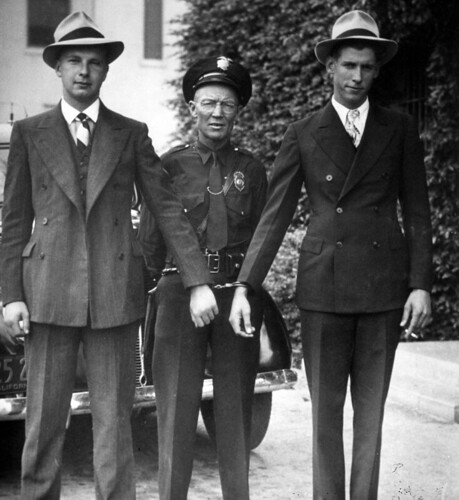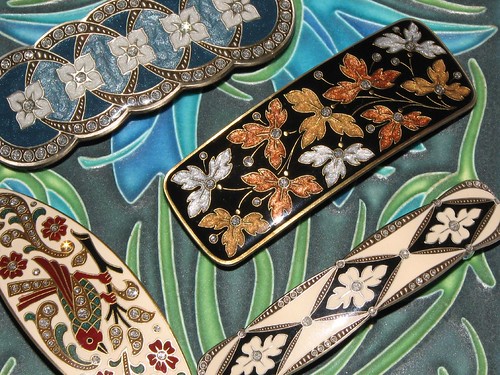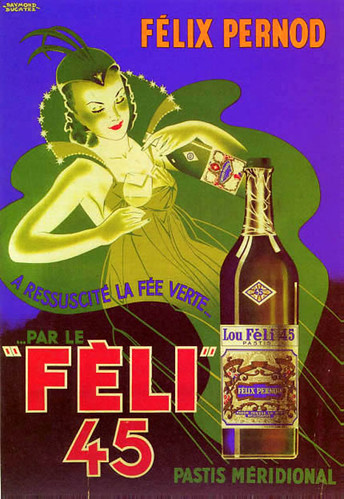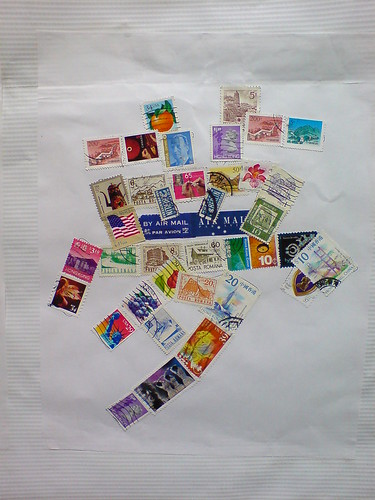
Fullerton Patrolman Ernest E. Garner with bank robbers, Fullerton, 1927
A recent New Yorker piece, A Pickpocket’s Tale, gives a fascinating portrait of Apollo Robbins, an expert in “theatrical pickpocketing.” The article is also chock-full of equaling fascinating pickpocket lingo, such as skinning the poke (“removing the cash from a stolen wallet and wiping it off before tossing it”), kissing the dog (“the mistake of letting a victim see your face”), and working single o (working without a pickpocket crew).
After reading the article, we were so obsessed inspired, we decided to take a closer look at even more thief words. Here are our favorites.
Adam Tiler
“Why, an autem diver is a pickpocket who practises in a church, and an Adam tiler his associate, who receives his booty, and runs off with it.”
Tales of My Father, and My Friends, 1823
An Adam Tiler is “a pickpocket’s accomplice, who takes the stolen goods and leaves with them.” According to the Oxford English Dictionary (OED), the term originated in the 1660s and comes from Adam, “the name of the first man,” and tiler, slang for “pickpocket.”
busk
“We would all have 36 hours to blag, beg and busk our way around the globe.”
“Taking liberties: a jailbreak to San Diego,” The Guardian, April 15, 2011
Busk meaning “to earn a livelihood by going about singing, playing, and selling ballads” may come from another meaning of the word, “to cruise as a pirate.” The word itself may come from the obsolete French busquer, “to prowl.”
ferret
“McCain employs a staffer known as the ‘ferret’ to find and expose pork-barrel provisions tucked away in major legislation.”
Evan Thomas, “Senator Hothead,” Newsweek, February 20, 2000
The word ferret has multiple meanings, the earliest of which is “a weasellike, usually albino mammal (Mustela putorius furo) related to the polecat and often trained to hunt rats or rabbits.” The word comes from the Vulgar Latin fūrittus, diminutive of Latin fūr, “thief.”
Ferret took on a figurative meaning around 1600, according to the OED, “to hunt after; to worry,” with the earliest recorded usage in Shakespeare’s Henry V: ” Ile Fer him, and ferit him, and ferke him.“ Ferret also means “to drive out, as from a hiding place”; “to uncover and bring to light by searching”; or “to search intensively.”
furuncle
“The word carbuncle, in Latin means live coal, and in Greek, anthrax signifies the same thing. While furuncle in Latin stands for thief or knave, pathologically it is synonymous with the term boil, which is too well known to require a definition.”
The Medical Summary, March 1915
Furuncle, “a circumscribed inflammation of the skin, forming a necrotic central core, and suppurating and discharging the core; a boil,” comes from the Latin fūrunculus, “knob on a vine that ‘steals’ the sap. Fūrunculus is diminutive of fūr, “thief.”
grift
“Like junkies, they’re hooked on the grift–it gives them an almost sexual rush–but they keep telling themselves they can pull out whenever they want and go straight.”
David Ansen, “Con-Artist Classic,” Newsweek, February 3, 1997
Grift refers to “money made dishonestly, as in a swindle”; “a swindle or confidence game”; or “to engage in swindling or cheating.” The word originated around 1906, according to the Online Etymology Dictionary, and may be a corruption of graft, “dishonest gain acquired by private or secret practices or corrupt agreement or connivance,” or “a business, process, place of concourse, or office, in or at which dishonest gain, by corruption or direct thieving, may be acquired.”
gun moll
“‘A dip—pickpocket—and his girl, or gun-moll, as they call them,’ translated Kennedy. ‘One of their number has evidently been picked up by a detective and he looks to them for a good lawyer, or mouth-piece.’”
Arthur B. Reever, The Dream Doctor, 1914
A gun moll is “the girlfriend of a gangster.” Gun here doesn’t refer to the weapon but is from gonif, slang for “thief.” Gonif is Yiddish in origin, coming from the Hebrew gannabh, “thief.” Moll comes from the “nickname of Mary, used of disreputable females since early 1600s.”
keister
“President Reagan has apologized to a freshman congressman for using the word ‘keister‘ to describe the human posterior.”
“President apologizes for ‘keister,'” The Pittsburgh Press, September 13, 1983
Keister became slang for “buttocks” in the 1930s, says the OED. The earliest meaning of the word is “suitcase, satchel” (1882), and in 1913 came to mean “a strong-box in a safe.” The Online Etymology Dictionary says that the word may come from the “British dialect kist (northern form of chest) or its German cognate Kiste ‘chest, box,” and the connection to “buttocks” may be via the “pickpocket slang sense of ‘rear trouser pocket’ (1930s).”
prat
“Topping a poke: If the wallet is hidden in a rear pocket, the pickpocket pushes it up from the bottom of the prat until it is visible, then either ‘pinches,’ ‘forks,’ or ‘spears’ it.”
“Know How They Do It So You’re Not ‘Dipped,‘” The News and Courier, September 7, 1987
Prat is another word for “buttocks,” originating in the 1560s as criminal slang. Around 1914 the word entered U.S. criminal slang as “hip pocket,” and around 1968, in British slang as “contemptible person.”
Prat-digging is “the action of stealing for a hip pocket,” says the OED.
smart aleck
“This reminds us of the time a smart-aleck friend told us the word ‘gullible’ wasn’t in the dictionary.”
James Taranto, “Blago-What? Never Heard of Him,” The Wall Street Journal, December 10, 2008
Smart aleck (which is sometimes hyphenated) refers to “a person regarded as obnoxiously self-assertive,” or “an impudent person.” The word may come from Aleck Hoag, a “19th-century American confidence man and thief.”
According to Wordorigins, “Hoag and his wife Melinda operated several confidence games where Melinda would pose as a prostitute and Aleck would rob the johns of their valuables.” Hoag would then pay off police to escape arrest.
velociraptor
“At about this time last year I wrote a column on Mike Novacek, whom I believed was the American Museum of Natural History’s chief dinosaur hunter, expert, velociraptor whisperer—whatever the term of art is for the big buana, the institution’s primo paleontologist.”
Ralph Gardner Jr., “The Coolest Dude Alive,” The Wall Street Journal, June 28, 2011
A velociraptor is “a small active carnivore that probably fed on protoceratops; possibly related more closely to birds than to other dinosaurs.” The word originated around 1924, says the Online Etymology Dictionary, and comes from the Latin velox, “swift,” plus raptor, “robber.”
The oviraptor, another type of dinosaur, comes from the Latin for “egg thief,” due to “the fact that the first fossil specimen was discovered atop a pile of what were thought to be Protoceratops eggs.” However, it was found that “the eggs in question probably belonged to Oviraptor itself, and that the specimen was actually brooding its eggs.”
Can’t get enough? Check out our post on Breaking Bad words, Drugs, Thieves, and Special Sauce, and these lists: A Swell Mob, A Whiz Mob, and The Grifters.
[Photo: CC BY 2.0 by Orange County Archives]




